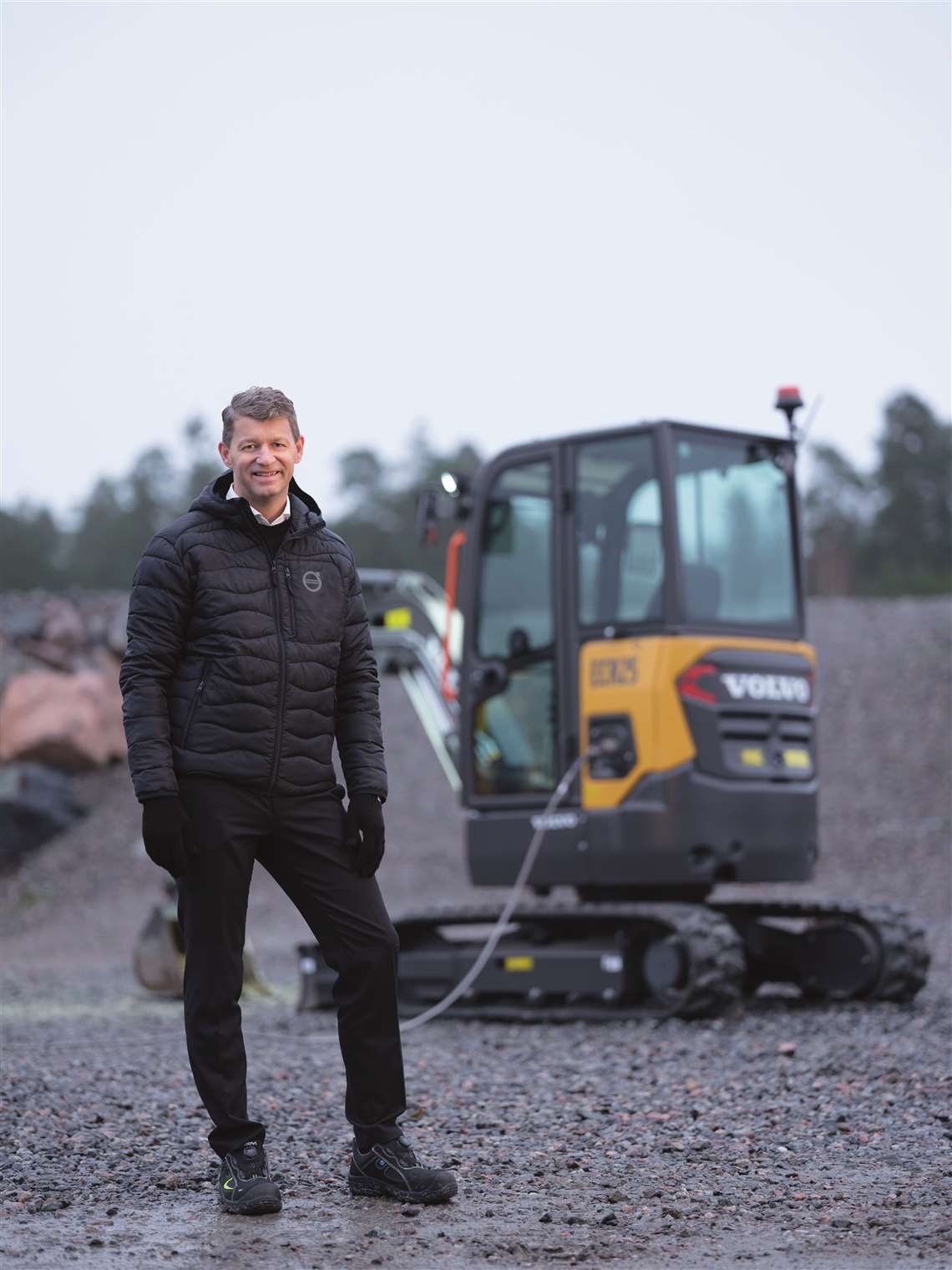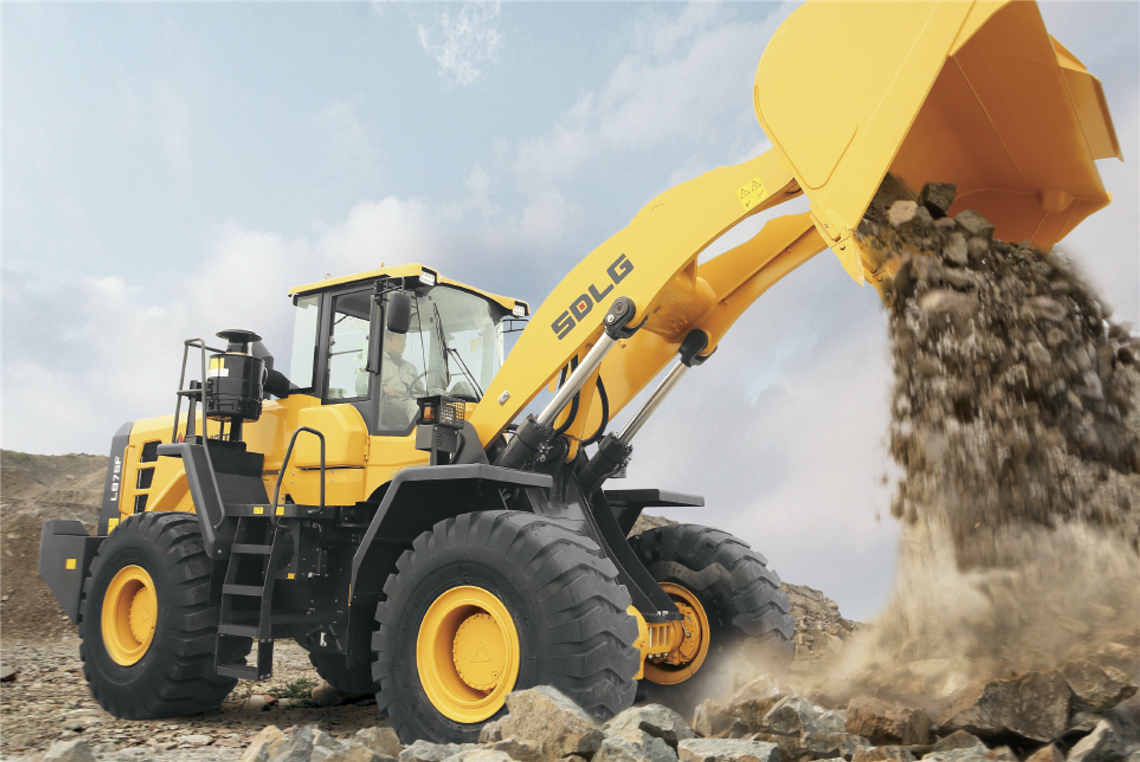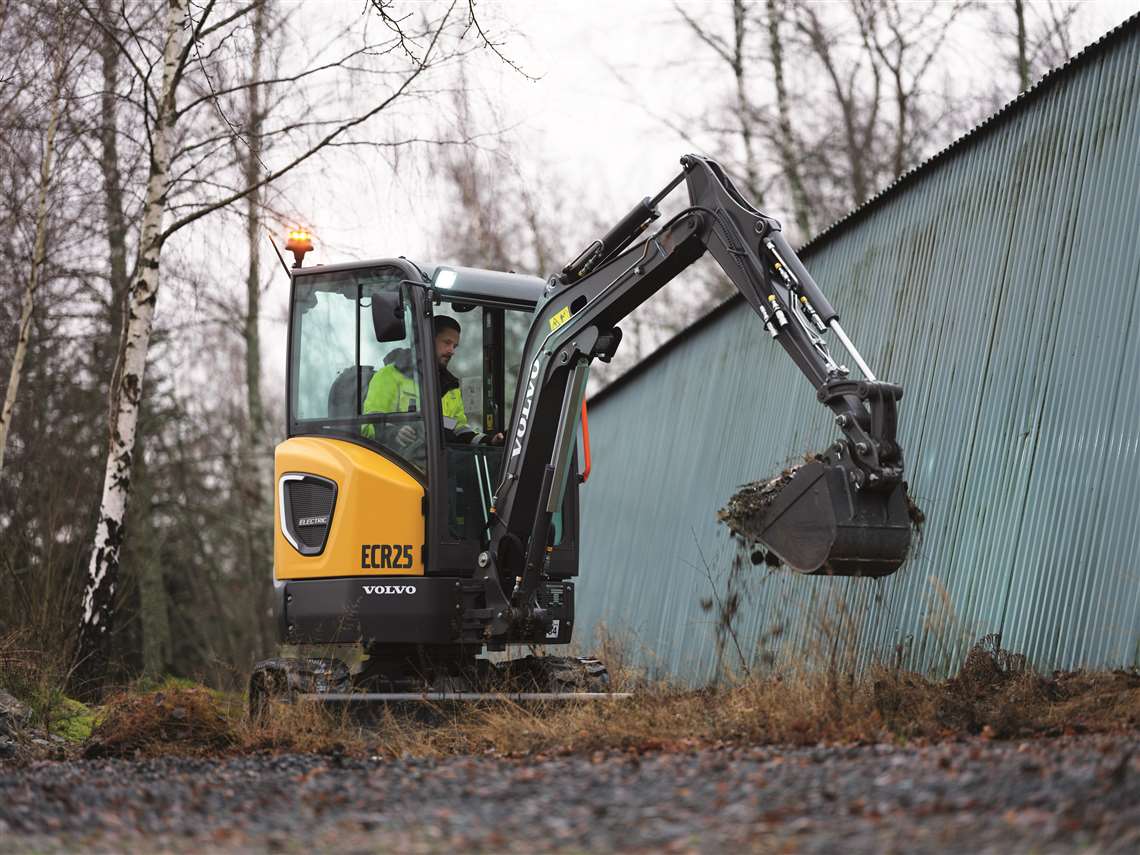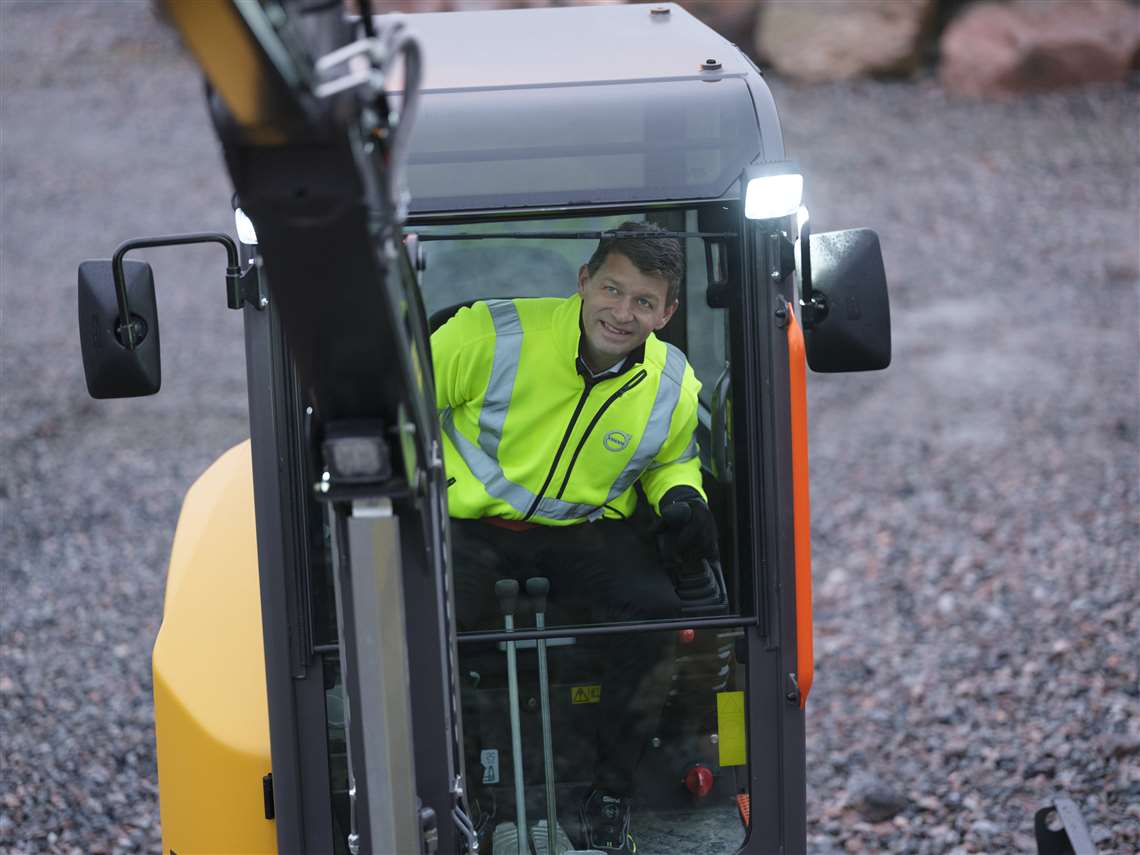Interview: Volvo CE’s Melker Jernberg
19 February 2021
Melker Jernberg, President of Volvo Construction Equipment, talks to Andy Brown about electric power, the impact of Covid-19 and China’s construction industry.
 Melker Jernberg, President of Volvo Construction Equipment
Melker Jernberg, President of Volvo Construction Equipment
There’s an old saying: the more I practice the luckier I get. During my hour-long conversation with Melker Jernberg, President of Volvo Construction Equipment (Volvo CE) he returns several times to the theme of luck.
It can be argued that construction has been luckier during Covid-19 than many industries, with construction mostly being deemed ‘essential’ by governments and work largely continuing.
As construction equipment sales dropped in most of the world in 2020 the shining light and exception was China, where sales increased by double digits. Volvo CE has a strong foothold in the country, partly thanks to its SDLG joint venture, and benefited from China’s strong economic performance.
China performing so well provided a big boost to the company’s sales figures for 2020 but, of course, it is not luck that the company has a strong presence there. Just as if, in five years’ time, electric construction equipment sales significantly increase – that would benefit Volvo CE given their electric focus. However, groundwork is being laid today to reap the rewards tomorrow. The more I practice, the luckier I get.
Global construction sales
Commenting on the global situation regarding Covid-19, Jernberg says, “You can look at many different businesses around us that have been heavily affected, especially in Q2 and Q3 in 2020. It’s not, of course, only pure luck that we are where we are in the world. It is not luck that we have the customers and the dealers that we have and the products that we have. We are lucky that we are in a kind of business that has been progressing. But if you translate that into the result, I’m extremely proud that we have the organisation that we have, because there has been so much work.”
The company’s financial results for 2020, given all that happened in the world, have been robust. Europe and North America suffered large declines in sales in the first half of the year but mounted a recovery – of sorts – in the second half of the year. And then there’s China.
In 2020, China accounted for over a third of worldwide construction equipment sales. There’s an argument to be made that, for the health of the industry, this figure is too high, that it is dangerous to be so reliant on just one country. In the past strong sales in China have been followed by severe dips. What’s Jernberg’s take on this?
“When it comes to China you can look at 2010, 2011 and 2012 as a volume bubble and say that we are in the same risk now. And then, of course, everyone is looking at that and being as careful as possible. However, on the other hand, I think that China is another country in 2020 compared with how it was in 2010 when it comes to business matureness, credit risks, handling customer behaviour and society as a whole. Maybe I will regret this, but there is more stability in the Chinese system today.”
Volvo CE has a joint venture with SDLG in China that has been running for over a decade and at the December 2020 Bauma China event the two companies had a joint stand. Although there have been questions raised in the industry over whether the product lines of the two companies are starting to overlap Jernberg calls the JV “fantastic” and says that the company’s position on wheeled loaders and excavators in China is strong.
 Volvo CE and SDLG are working together in China
Volvo CE and SDLG are working together in China
He adds that, “It’s very clear that the partnership drives our success, it’s the cooperation. And, of course, part of SDLG’s success is that everyone knows that they have a good cooperation with Volvo. And everyone knows that Volvo is also partly successful in China because we have good cooperation with SDLG. I think we are coming back to being lucky again, that we have this joint venture. So far, it’s a clear win-win.”
Electric consturction equipment
There are many OEMs in construction who are either looking at electric equipment prototypes or have already developed electric machines that are ready for mass production. Volvo CE are one of the leading OEMs in this field, and have ambitious targets when it comes to electric equipment. By 2030 the Volvo Group’s aim is for 35% of equipment sold to be electric. This means that the company are in a hurry and thinking long-term.
“To be able to be where we want to be in 2050, we need to be somewhere in 2040. That means, according to our calculation, that already 20, 30, 35% of all our vehicles and equipment should be electrified. And 35% of our volumes, that’s quite a lot. And then we need to have some volumes in 2029, 2028 and 2027. Then you just do the calculation and then you realise you are in a hurry. It’s a fun hurry because it’s so rewarding.”
The company are producing electric-powered compact excavators and wheeled loaders, having stopped developing new diesel versions. Volvo CE were better known for their larger construction equipment, rather than compact, so the move makes sense from a business perspective in terms of increasing sales in a sector that hasn’t been a traditional strength, but there is no doubt that Jernberg feels passionately about this issue.
He says, “We have a big responsibility with the footprint we have and the opportunity we have to be more sustainable. That is a big driving force for Volvo CE in general and transforming as a company. One part of this is, of course, electrified machines.
 Volvo CE has invested in electric compact excavators and wheeled loaders
Volvo CE has invested in electric compact excavators and wheeled loaders
“It’s very easy to just make a PowerPoint together with the communication department and send it out and say, ‘this would be good’, but it is something else actually transforming a company. We have extremely high ambitions, both for Volvo CE and the Volvo Group.”
Electric power is one part of ‘alternative power’ along with other options like hydrogen and synthetic fuels, just as alternative power is but one aspect of new technology, which includes automation, BIM and new mapping and surveying tools such as drones.
New technology and innovation
Jernberg acknowledges that construction has, “not been the quickest” when it comes to developing and embracing new technology but says it is wrong to think that those in the industry don’t like innovation. He comments that it has more to do with the industry making production machines that have to last a long time and work in tough conditions, saying that construction is, “a grounded business with grounded people and grounded companies.”
New technology is being increasingly embraced and integrated though. Towards the end of 2019 Volvo created a separate business unit for automation, Volvo Autonomous Solutions and the Volvo Group has a joint venture with Daimler for fuel cell development. Volvo CE are also working with Finland’s Norrhydro to develop a digital hydraulic actuator that increases productivity while cutting fuel bills and CO2 emissions in construction applications.
Later in the interview, when I ask Jernberg about the company’s plans to add to the product range (dozers, perhaps?) he delivers a smooth and polished answer that doesn’t give too much away before returning to the topic of Volvo’s work with Daimler and Norrhydro and their importance. He’s right to highlight this; while an OEM’s product range will always be vital, it is partnerships and working with companies on new technological solutions such as fuel cells or machine hydraulics that will be key for the leading OEMS to stand out from their competitors and offer new efficiencies.
2021 and beyond for construction
 Jernberg in one of Volvo CE’s electric excavators
Jernberg in one of Volvo CE’s electric excavators
The impact of Covid-19 has been well documented on businesses, but Jernberg talks passionately about the cost of the pandemic on people’s mental health. He also gives us an insight into his management style, saying that, “Most of my view of how you develop a company is that you educate yourself through meeting people, you get input and you learn about market conditions.
“You learn about customers, you learn about product needs. You learn from meeting a customer that says, ‘I don’t care about digitalisation, I just need cheaper spare parts.’ The working life is a learning journey, and that gives you input in all the decisions you take, if it’s electrification, a reorganisation, buying a new product line or doing an event.”
He mentions that these interactions can take place online, but that it is not quite the same. Hopefully 2021 will allow us to return to these normal social interactions and Jernberg is optimistic for the year ahead. Looking to longer-term goals, he mentions once again the company’s target of producing 35% electric equipment by 2030 and is excited by the ways new technology will enable them to interact, supporting dealers and communicating with customers.
The phrase, “The harder I practice the luckier I get,” is attributed to the golfer Gary Player but Ingemar Stenmark, a former World Cup alpine ski racer from Sweden, is also credited with a version of the saying. Volvo CE certainly seem to be working on the building blocks that will enable them to be ‘lucky’ in future.
STAY CONNECTED



Receive the information you need when you need it through our world-leading magazines, newsletters and daily briefings.
CONNECT WITH THE TEAM








